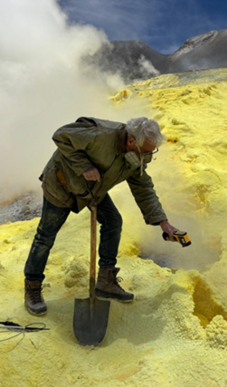Gas analysis

Gas geochemistry is an essential aspect in many areas of research, such as volcanology, environmental research and raw materials exploration.
The GFZ's Gas Geochemistry Laboratory (GGL) routinely analyzes most permanent gases. In addition to the gas phase from various sources, process gases (e.g. corrosion and hydrolytic H2 in boreholes) and synthetic tracer gases (e.g. SF6) can also be analyzed.
On-site gas sampling (boreholes, active volcanic areas, cave systems, underground salt and gold mines, CO2 sequestration sites and areas with natural hydrogen emissions) makes up a large part of the GGL team's work. The installation and maintenance of permanent gas measuring stations is also part of the GFZ GGL's work.
Instruments

A large number of gas analyzers and a wide range of gas separation methods are available.
Several quadrupole mass spectrometers (Omnistar, Pfeiffer Vacuum) and a mobile field device (Mini Ruedi, Gasometrix).
Gas chromatographs (SRI 8610), equipped with various separation columns and detectors (FID, TCD, HID).
Photoacoustic sensor (Innova 1412, Air Tech Instruments) for measuring CO2, CH4, H2 and H2S in the µmol/mol range and SF6 in the nmol/mol range.
Toxic Vapour Analyzer (TVA, Thermo Fisher Scientific (portable GC for hydrocarbons)
Alpha Guard (Bertin Technologies) for radon
Li-COR accumulation chamber systems (Li 8250-M4 multiplexer with LI 8100 and LI-7810 trace gas analyzer) for CO2 and CH4 flux measurements